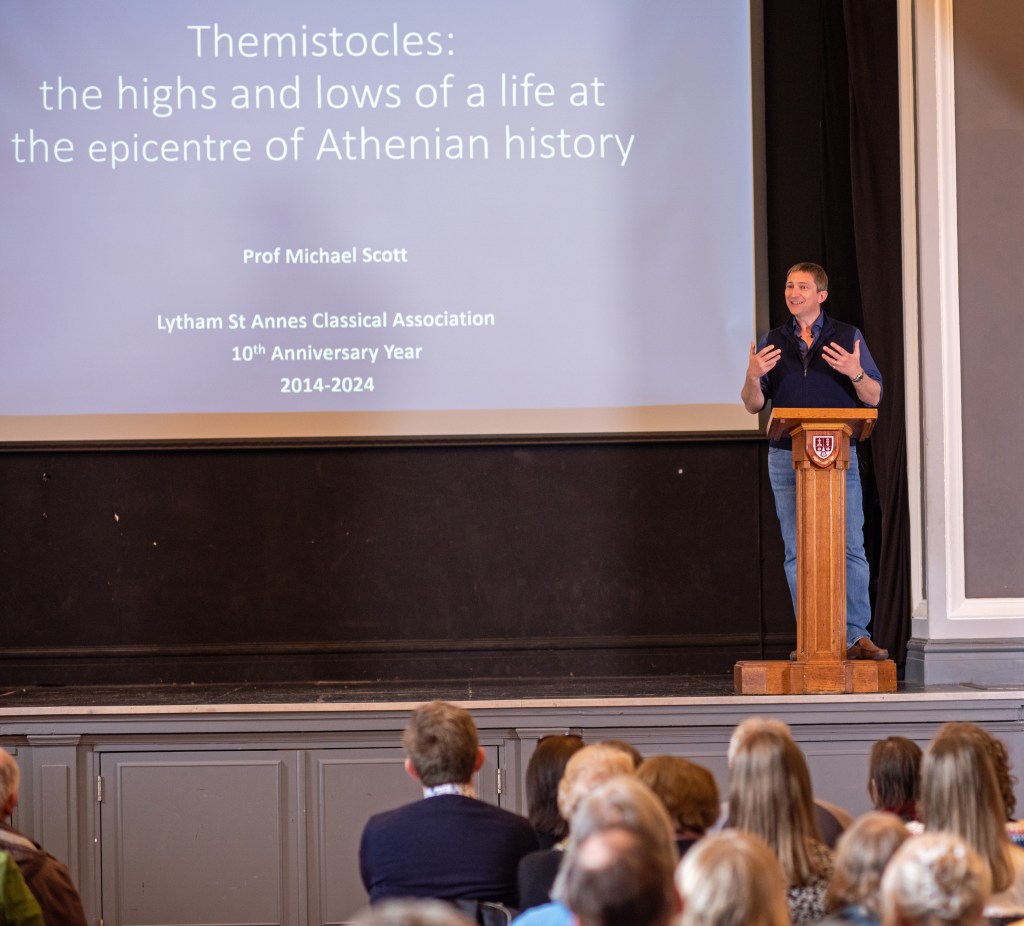To celebrate our tenth anniversary, we have enjoyed a special programme of events across 2023-24 beginning with our Roman Day in September and, after a series of lectures from some of our favourite speakers, we rounded off the year with our Ancient Worlds Day where we embraced our childhood classical obsessions by jumping in our dressing up box and making our very own Atlantis treasure hunt, Egyptian collars, Medusa masks, Roman shields and posing with some incredible hand-painted cutouts (make sure you read to the very end of this blog!).



Visitors could move seamlessly from perusing our bookstall and winning their tombola prize, to face painting, to then entering the ancient sanctuary of the Oracle of Zeus at Dodona where, thanks to Chris and Richard from the University of Bristol Virtual Reality Oracle Project, headsets could be worn to enter a whole different reality! Then it was along the corridor to write your name in hieroglyphs, decorate your mask, have a go at Vocabulous, and pose as Cleopatra or Tutankhamun!




At 12.30pm, we assembled in the main hall at AKS to watch the Grand Final of our Ancient Worlds Competition – four fantastic mini talks by young speakers who pitched their innovative ideas for a new classics documentary. Head to our Competition page to read all about the winners as there’s a spoiler on the way….

Our President Prof. Michael Scott, assisted by our Chair Katrina had the enjoyable but unenviable task of picking between the four documentary pitches:

Ffion Shute shares how it felt to be crowned the winner for her talk on the Herculaneum scrolls: “I was extremely happy to win the Ancient Worlds Competition. I feel a real enthusiasm for the topic and it is very much at the cutting edge but that was no guarantee that some burnt old papyrus would go down well on the day! However, there was a relaxed and festive feel as I went up on stage both because it was the second time I’d been in the final but also amidst all of the other activities on Ancient Worlds Day. Many thanks to everyone for coming, for laughing in all the right places and supporting me in the People’s Choice Award vote.”
Congratulations to all entrants into this year’s competition, especially our finalists, and a huge thank you to the Classical Association for sponsoring the prizemoney, and to Blackpool Palatine Rotary who sponsored our Lancashire Award. After the Final, Ffion was also awarded an inaugural prize, generously sponsored in honour of the Egyptologist, Paul Jordan, who fittingly enough worked as a producer and writer of BBC television documentaries, for her writing excellence for the Association over the past year.

“This was totally unexpected but I was very touched and it was great to know that my regular website feature on lesser-known Roman authors, Know your Frontinus from your Fronto! is so appreciated. It’s great that the Association has created an ecosystem over 10 years where this sort of thing can be out there and I promise the best instalment yet in June!”
Keep an eye out on our blog for Ffion’s next piece.
Presidential Lecture
The highlight of the day was of course our Presidential Lecture – marking Prof. Scott’s tenth visit to the Association – and Ffion recaps the lecture for those who weren’t able to come along on the day:
“Professor Scott started by presenting us with the traditional view of the character of Themistocles, as given by Thucydides: that he was one of the most illustrious of all Greeks, talented and gifted with the foresight to always know the right course of action. However, a closer examination of his life reveals that the truth is far more complicated.
Themistocles’ birth in around 524 BCE was relatively undistinguished. According to Plutarch, his father, Neocles, was ‘not a particularly eminent man’ and his mother, Habrotonon, was supposedly not even Greek but rather from the northern region of Thrace. Although he belonged to the deme Phrearrii, Themistocles was thus legally considered a ‘nothos’, a term not much politer than ‘bastard’. As a child, he was intelligent and energetic, but also stubborn and resistant to discipline. These character traits followed him well into early adulthood, when he became something of a nuisance, with his love of the high life bringing shame upon his family. Libanius, a much later teacher of rhetoric, wrote a speech supposedly based on a real event from Themistocles’ life, when Neocles was forced to legally disown his son in an attempt to curb his reckless manner of living.

During Themistocles’ early life, Athenian democracy developed to its fifth century height. This new system afforded him some opportunities as a less distinguished member of society. In his twenties, he held the unglamorous position of ‘Water Commissioner’ for a time, but did not hold any office in keeping with his illustrious reputation until he turned thirty. In 493, he was elected archon, the most important civic office in Athens. As archon, he oversaw the development of Athens’ port of Piraeus, showing a particular interest in Athens’ naval power.
In 490, he took part in the Battle of Marathon against the Persians, after which other generals such as Aristides were given honorary titles and positions. Themistocles was given no such honour, hinting at his lack of popularity among the Athenians. At this point, Professor Scott discussed in particular detail the use of ostracism in Athens at this time. During an ostracism, citizens wrote down the name of a politician they wanted banished on a shard of pottery, or ostrakon. The politician with the largest number of votes was banished from Athens for 10 years. This was occasionally a useful way of getting rid of troublesome and unpopular politicians, but it became very popular in the 480s, with five statesmen being ostracised during this decade, when Themistocles was in his late thirties and early forties. His name appears on some ostraka from this period: while not unpopular enough to actually be ostracised, he was considered troublesome enough to be included on the list.
An important moment in his career came in the mid 480s, when a new seam of silver was discovered in Athens’ mines at Laurion. The original plan was to divide up the new money equally among the citizens, but Themistocles argued in favour of investing it all in expanding Athens’ fleet, as the city was a risk from invasion by other seafaring city-states such as Aegina, again showcasing his interest in naval affairs. The people agreed, and the size of Athens’ fleet was increased to 200 ships strong by 483.

During the second Persian invasion in 480, Themistocles was commander of the Athenian fleet. However, the Greek allies disliked him to the extent that they put a Spartan, Eurybiades, in overall command of the assembled Greek ships. When Persian forces marched down as far as Attica, Themistocles successfully advocated the evacuation of Athens and insisted that the Greek fleet stand its ground off the island of Salamis, interpreting the Delphic Oracle’s advice to utilise their ‘wooden walls’ as using their ships. When the other Greek generals refused, even when he threatened to abandon them and take the Athenian ships off to Sicily, he supposedly sent a herald over to the Persian king, telling him to fan out his fleet and stop the Greeks from escaping. Thus Themistocles engineered the encirclement of the Greek fleet and triggered the Battle of Salamis, which proved to be a decisive Greek victory. After the battle, the Greek allies were giving out prizes for bravery and brilliance, but were unable to agree on who was the greatest general, as they all voted for themselves! However, they all agreed on Themistocles for second place, so the Spartans awarded him a prize for cleverness.
Back home in Athens, the situation was rather worse: Themistocles was ignored once again as his peers were awarded more honours. He instead occupied himself with building Athens’ defensive walls; he went to Sparta to reassure them that he was doing no such thing, again engaging in dishonest diplomacy. He also commissioned a large temple to Artemis Aristoboule (Artemis the Good Councillor) in the middle of Athens with a bust of himself in font of it – a very obvious monument to his own achievements. This level of arrogance did not go unnoticed by the Athenians: in 472/1, he was ostracised. There are many ostrakoi bearing his name from this year, although only with 11 different types of handwriting. Professor Scott invited us to speculate whether this was civil servants helping illiterate citizens or whether there was some kind of foul play involved! Either way, Themistocles had obviously made enemies through his attitude and was deeply unpopular in his home city.
Sparta took the opportunity to send Athens ‘evidence’ that Themistocles had been complicit in their general Pausanias’ betrayal to Persia, leading to the Athenians recalling Themistocles from exile. When he refused, they convicted him of treason in absentia, and sent forces to kill him overseas. He escaped to the Persian court, where he prostrated before the king and was granted a year to learn Persian so that he could help coordinate Persia’s next attack on Greece. In the meantime, he was made satrap (governor) of Magnesia. Conveniently, he died in 459 just before he was called upon to deliver on his promise to aid the king. Various rumours surround his death, including that he committed suicide, was murdered by Athenian spies, and that he miraculously expired. He was around 65 years old.
Even though his body was supposedly exhumed and mutilated by vengeful Greeks after his death, his reputation was resurrected in less than two decades back in Athens. By the time that Thucydides was writing, the Athenian Empire owed so much to its fleet that its people had no choice but to recognise the deeds of the man who had invested in its ships and port, and engineered Greek naval victory. He was granted a tomb at the port of Piraeus that he had helped build, and went down in history as one of Athens’ greatest statesmen. It is tempting to think that Themistocles was gifted with some kind of miraculous foresight that set him above the other Athenians of his time, advocating for naval expansion and gifting Athens generations of wealth and power. However, it is only with the benefit of hindsight that historians such as Thucydides were able to say what great things he set in motion. Had the outcome of Salamis been different, his unpopularity might have continued well beyond his death. The picture of Themistocles that emerges from close examination is one of a great man who, for all his achievements and later credit, was mistrusted and shunned during his own lifetime.”
We couldn’t let our President leave without trying the cut outs…!


We can’t wait to welcome you to our new season of events, starting in September 2024 – do give us a follow on social media @lsaclassics and keep in touch by becoming a member or even popping along to our free online Book Club over the summer!

You must be logged in to post a comment.